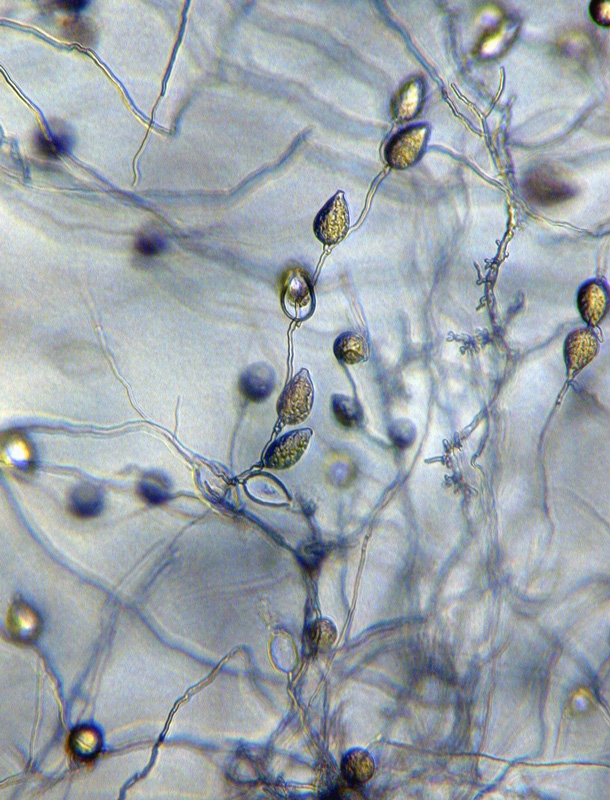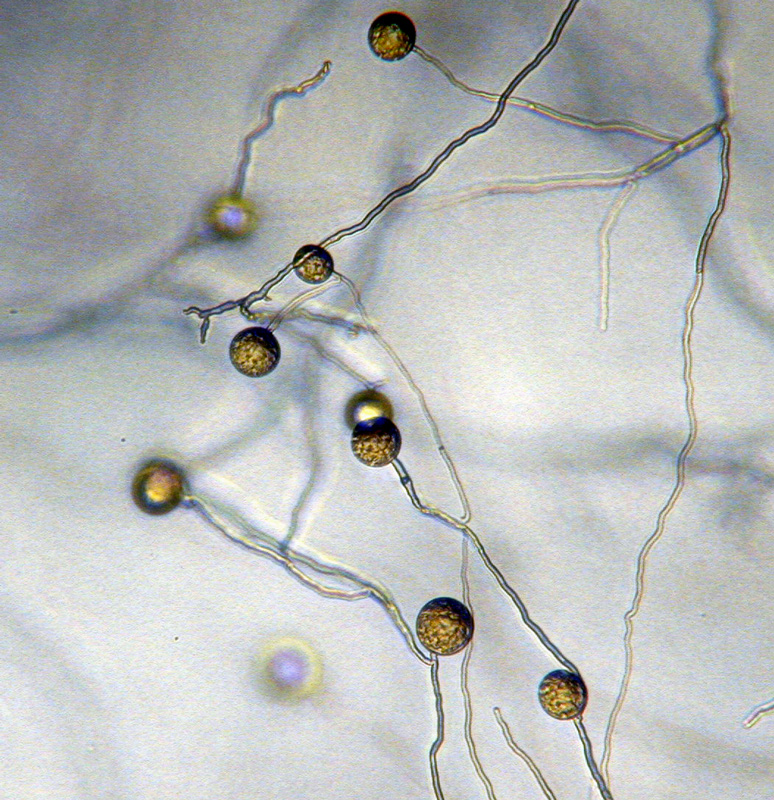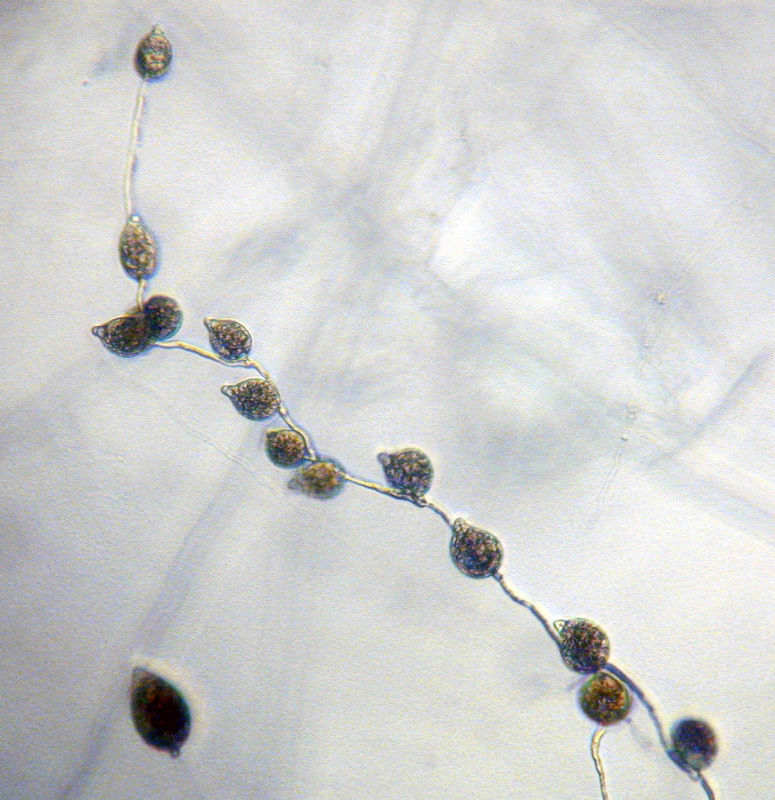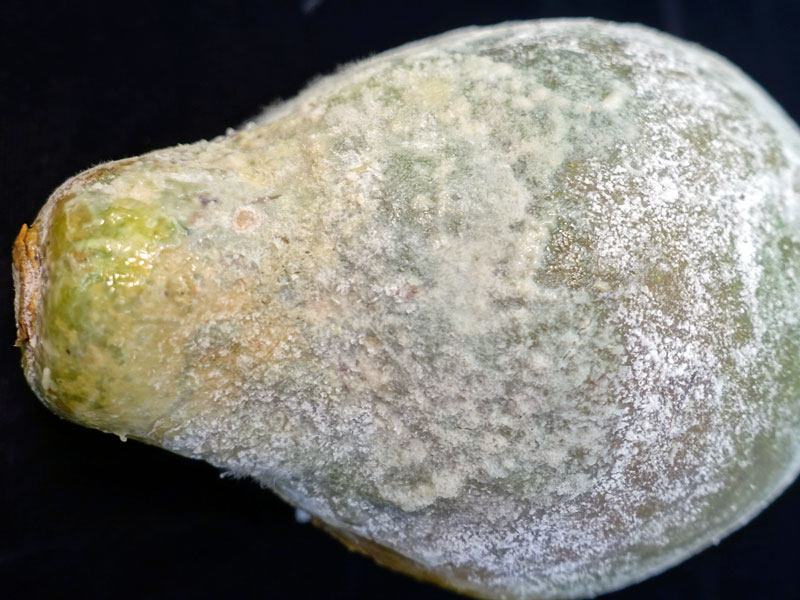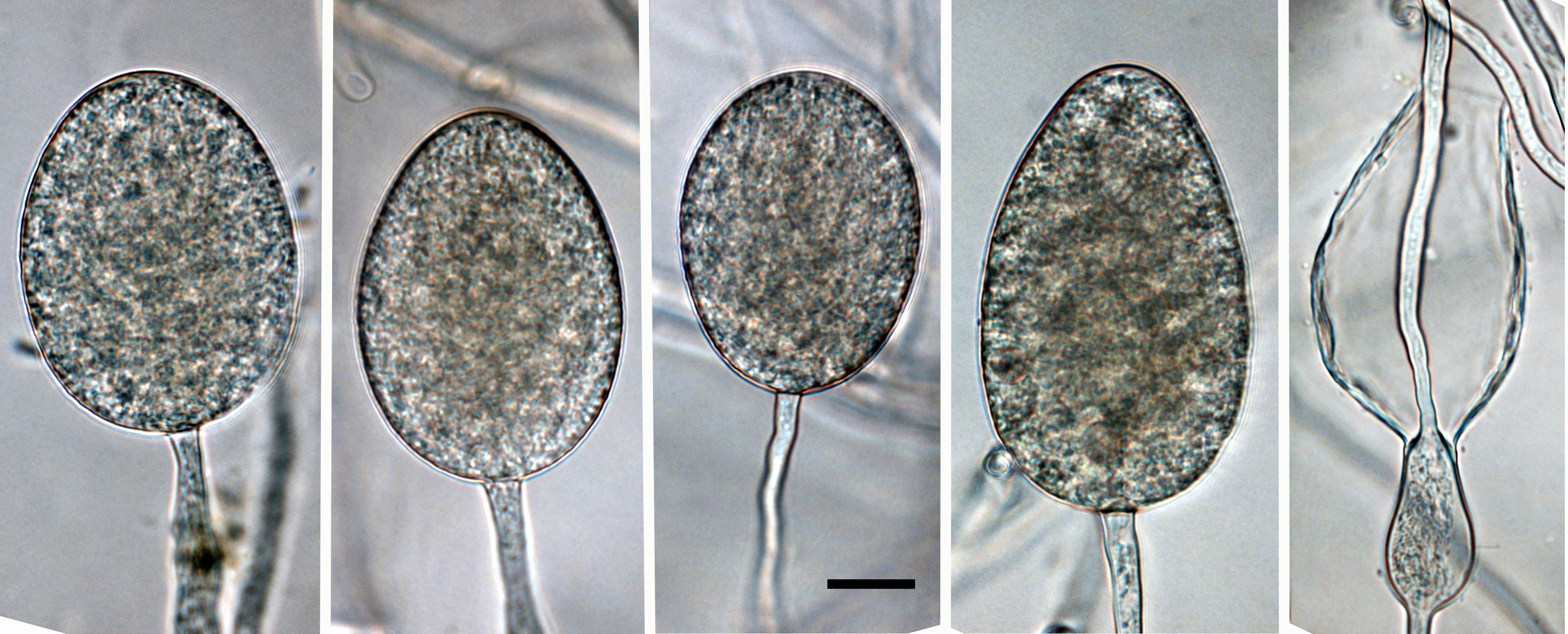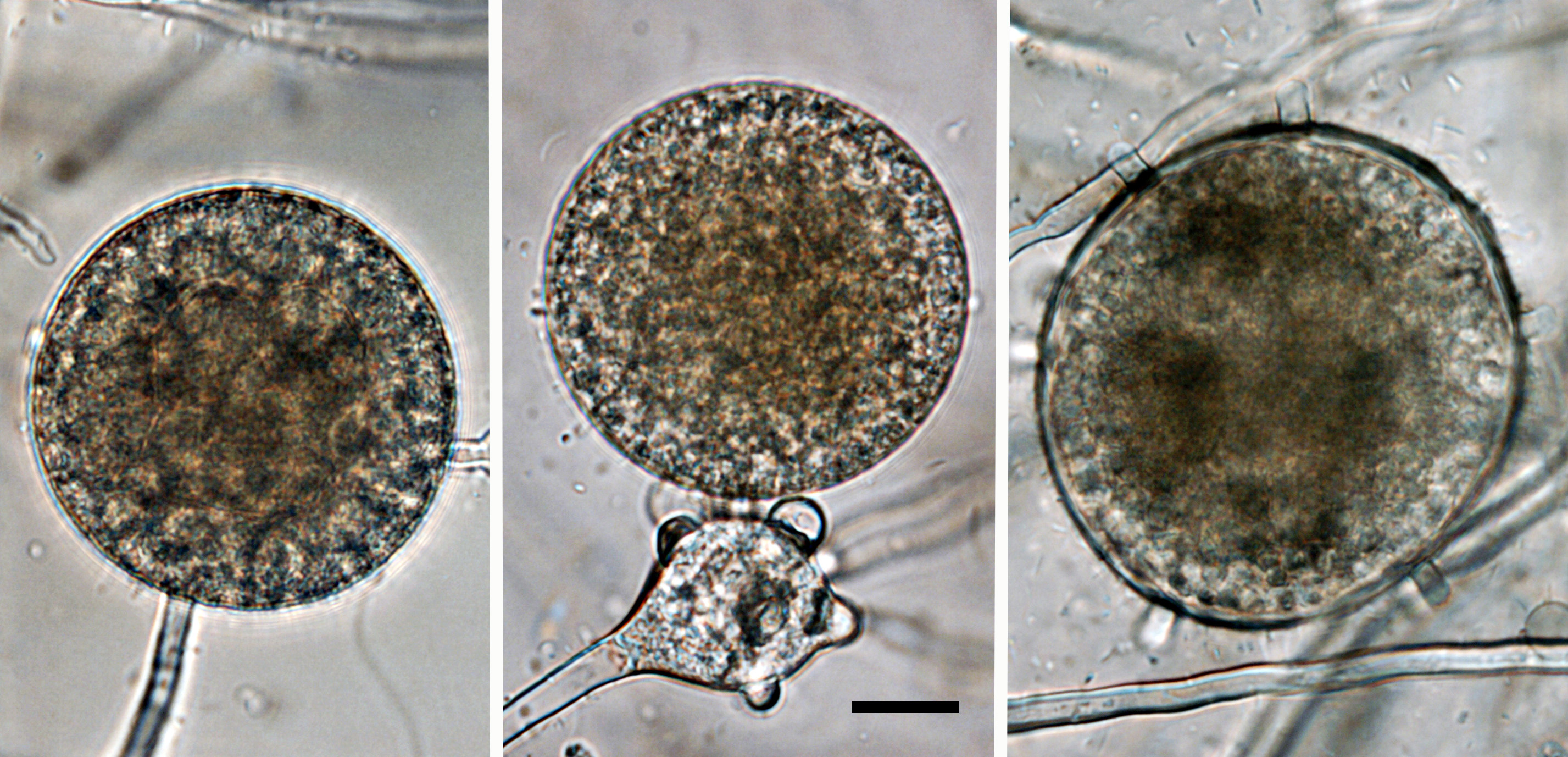Gallery
Image Type
Morphological Structure
Clades
Phytophthora palmivora sporangia borne on simple sympodial sporangiophores
Phytophthora palmivora sporangia borne on simple sympodial sporangiophores
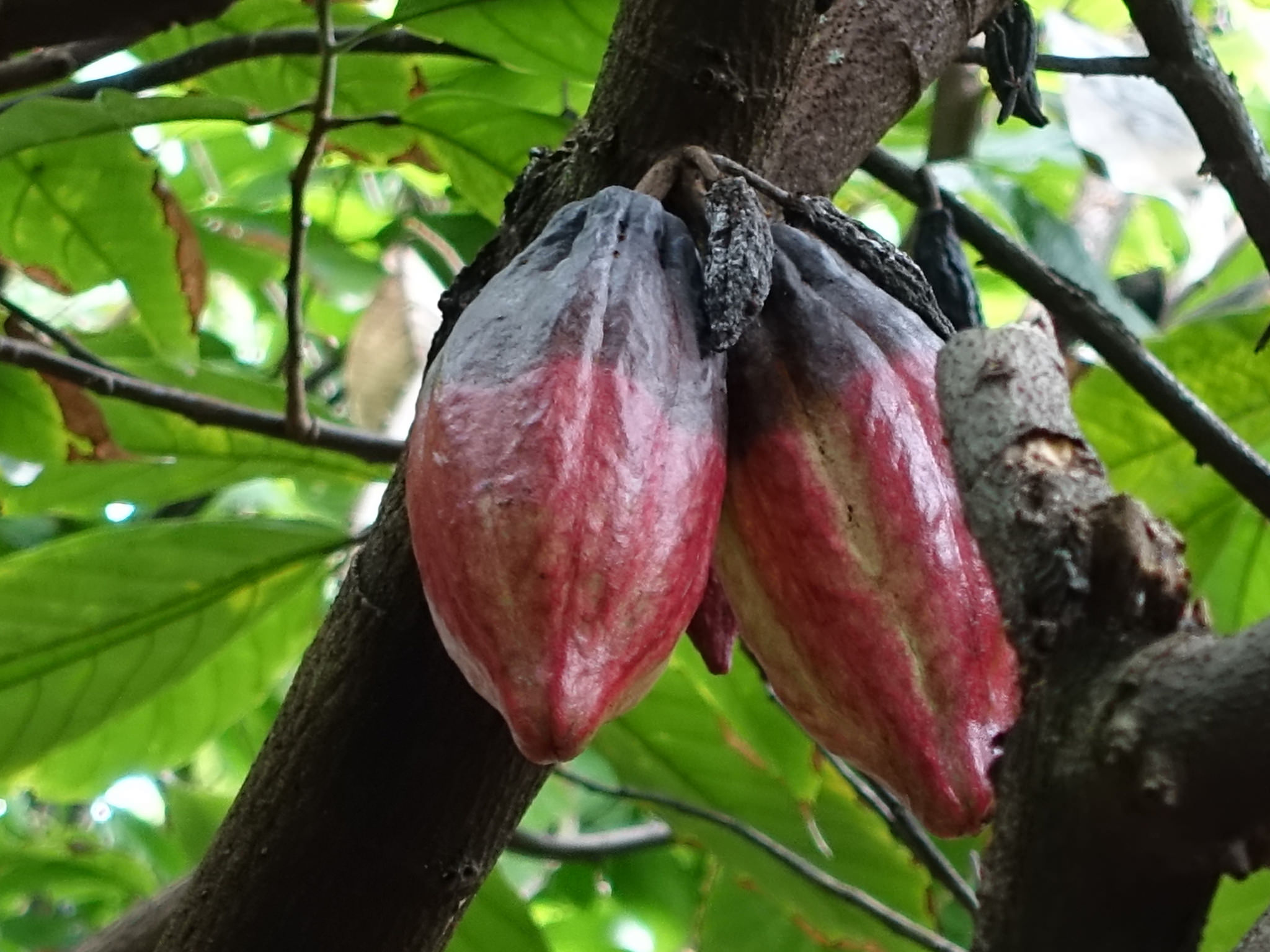 black pod rot of cacao ( Theobromae cacao ), caused by Phytophthora palmivora innbsp; Papaikou, Hawaii; watch: youtu.be/vgiSu8_M-xU; photo and video presentation by Scot Nelson, University of Hawaii at Manoa
black pod rot of cacao ( Theobromae cacao ), caused by Phytophthora palmivora innbsp; Papaikou, Hawaii; watch: youtu.be/vgiSu8_M-xU; photo and video presentation by Scot Nelson, University of Hawaii at Manoa
black pod rot of cacao (Theobromae cacao), caused by Phytophthora palmivora in Papaikou, Hawaii; watch: youtu.be/vgiSu8_M-xU; photo and video presentation by Scot Nelson, University of Hawaii at Manoa
Phytophthora palmivora symptoms on papaya fruit; photo by Scot Nelson, Univ. of Hawaii
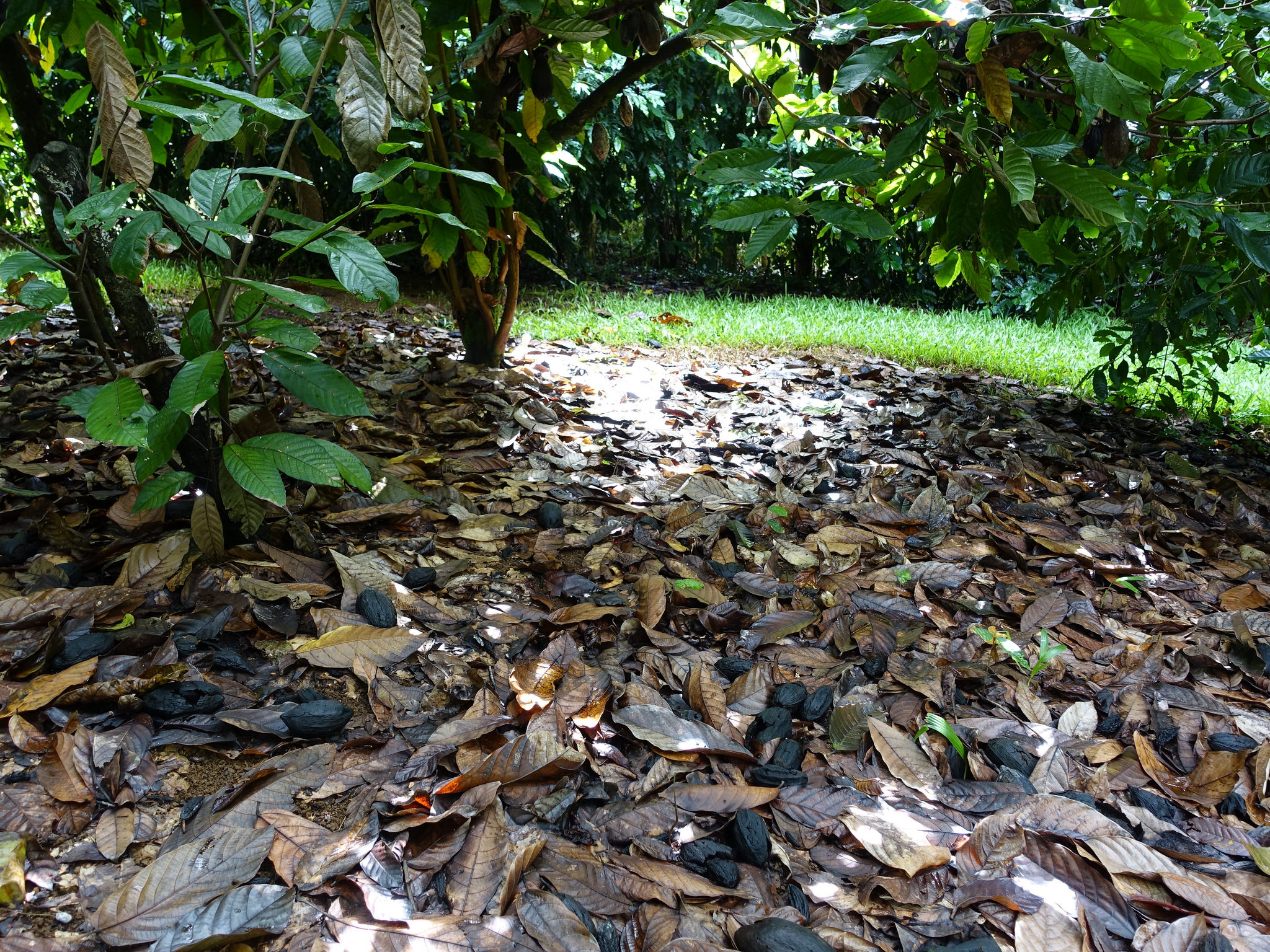 plant debris in a cacao ( Theobroma cacao ) orchard resulting from black pod rot caused by Phytophthora palmivora ; photo by Scot Nelson, University of Hawaii at Manoa
plant debris in a cacao ( Theobroma cacao ) orchard resulting from black pod rot caused by Phytophthora palmivora ; photo by Scot Nelson, University of Hawaii at Manoa
plant debris in a cacao (Theobroma cacao) orchard resulting from black pod rot caused by Phytophthora palmivora; photo by Scot Nelson, University of Hawaii at Manoa
Phytophthora spp. in Clade 4: portion of the seven-loci ML phylogeny featuring the type cultures of 212 described species (by T. Bourret). Notice the position of P. panamensis Ex-type CBS 147925. Gloria Abad, USDA S&T.
Phytophthora spp. in Clade 4: Morphological Tabular key (PDF) and Tabular key legends (PDF) in IDphy2 KEY SECTION. Notice the data of P. panamensis Ex-type CBS 147925. Gloria Abad, USDA S&T.
Phytophthora spp. in subclade 9a: portion of the seven-loci ML phylogeny featuring the type cultures of 212 described species (by T. Bourret). Notice the position of P. parsiana Ex-type SUC25. Gloria Abad, USDA S&T.
Phytophthora spp. in subclade 9a: Morphological Tabular key (PDF) and Tabular key legends (PDF) in IDphy2 KEY SECTION. Notice the data of P. parsiana Ex-type SUC25. Gloria Abad, USDA S&T.
Phytophthora spp. in subclade 7c: portion of the seven-loci ML phylogeny featuring the type cultures of 212 described species (by T. Bourret). Notice the position of P. parvispora Ex-type CBS 132772 = S&T BL 98. Gloria Abad, USDA S&T.
Phytophthora spp. in subclade 7c: Morphological Tabular key (PDF) and Tabular key legends (PDF) in IDphy2 KEY SECTION. Notice the data of P. parvispora Ex-type CBS 132772 = S&T BL 98. Gloria Abad, USDA S&T.
 Phytophthora parvispora colonies grown for 7 days on (a) V8reg; Agar, (b) potato dextrose agar, and (c) malt extract agar; photo by Krysta Jennings and Leandra Knight, USDA-APHIS-PPQ
Phytophthora parvispora colonies grown for 7 days on (a) V8reg; Agar, (b) potato dextrose agar, and (c) malt extract agar; photo by Krysta Jennings and Leandra Knight, USDA-APHIS-PPQ
Phytophthora parvispora colonies grown for 7 days on (a) V8® Agar, (b) potato dextrose agar, and (c) malt extract agar; photo by Krysta Jennings and Leandra Knight, USDA-APHIS-PPQ
Phytophthora parvispora colony morphology of the ex-type (PH072 – Bruno Scanu) grown for 5 days at 20°C on (a) carrot agar, (b) potato dextrose agar; photos by Bruno Scanu and Antonio Franceschini, Università degli Studi di Sassari, Italy
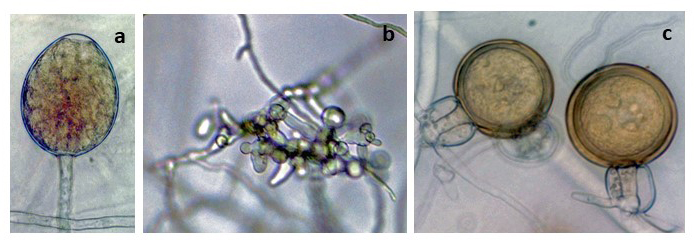 Phytophthora parvispora morphology of ex-type (PH072 ndash; Bruno Scanu) asexual and sexual phases: (a) sporangium, (b) hyphal swellings, (c) gametangia (oogonia and amphigynous antheridia) with plerotic oospores; photos by Bruno Scanu and Antonio Franceschini, Universitagrave; degli Studi di Sassari, Italy
Phytophthora parvispora morphology of ex-type (PH072 ndash; Bruno Scanu) asexual and sexual phases: (a) sporangium, (b) hyphal swellings, (c) gametangia (oogonia and amphigynous antheridia) with plerotic oospores; photos by Bruno Scanu and Antonio Franceschini, Universitagrave; degli Studi di Sassari, Italy
Phytophthora parvispora morphology of ex-type (PH072 – Bruno Scanu) asexual and sexual phases: (a) sporangium, (b) hyphal swellings, (c) gametangia (oogonia and amphigynous antheridia) with plerotic oospores; photos by Bruno Scanu and Antonio Franceschini, Università degli Studi di Sassari, Italy
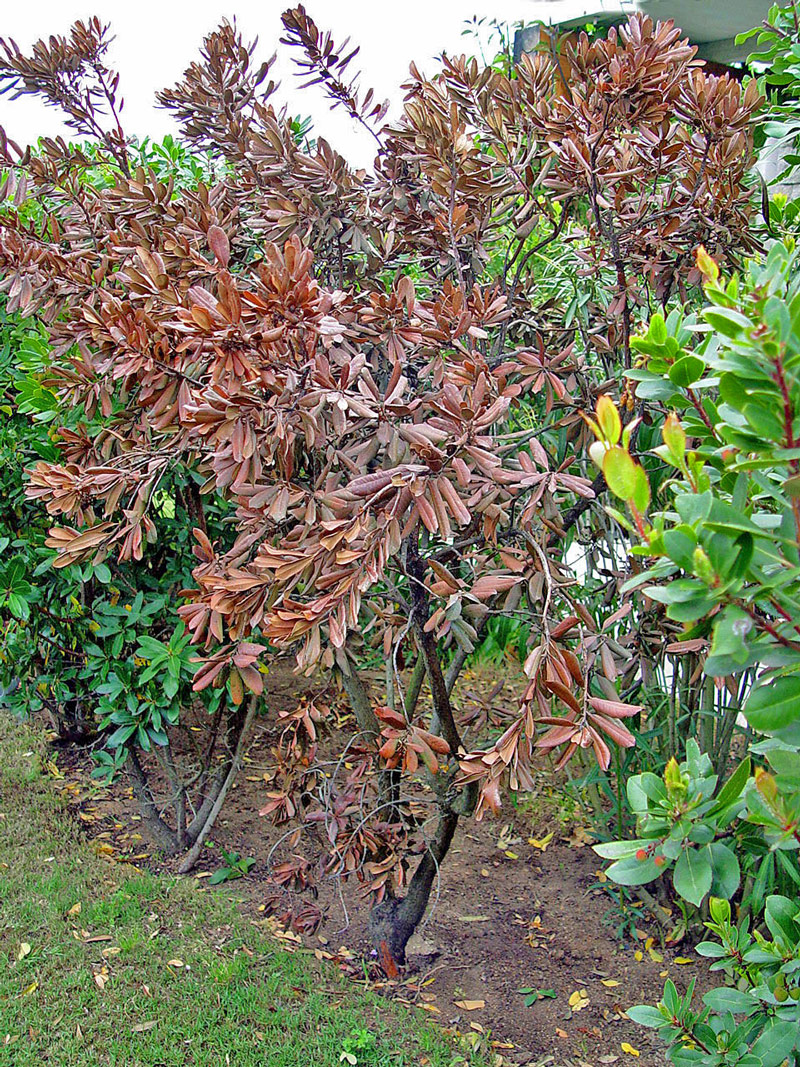 Arbutus unedo in an ornamental planting showing symptoms caused by Phytophthora parvispora in Sardinia, Italy; photo by Bruno Scanu and Antonio Franceschini,nbsp;Universitagrave; degli Studi di Sassari, Italy
Arbutus unedo in an ornamental planting showing symptoms caused by Phytophthora parvispora in Sardinia, Italy; photo by Bruno Scanu and Antonio Franceschini,nbsp;Universitagrave; degli Studi di Sassari, Italy
Arbutus unedo in an ornamental planting showing symptoms caused by Phytophthora parvispora in Sardinia, Italy; photo by Bruno Scanu and Antonio Franceschini, Università degli Studi di Sassari, Italy
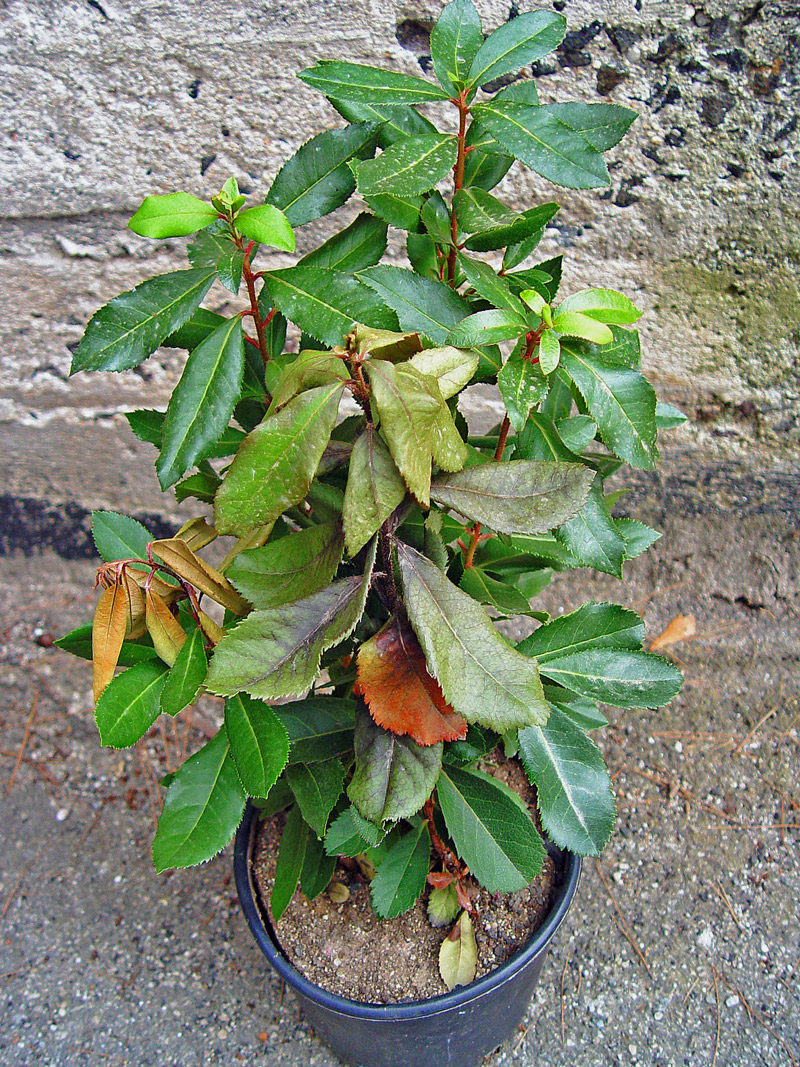 Arbutus unedo in nursery with shoot dieback and wilting caused by Phytophthora parvispora in Sardinia, Italy; photo by Bruno Scanu and Antonio Franceschini, Universitagrave; degli Studi di Sassari, Italy
Arbutus unedo in nursery with shoot dieback and wilting caused by Phytophthora parvispora in Sardinia, Italy; photo by Bruno Scanu and Antonio Franceschini, Universitagrave; degli Studi di Sassari, Italy
Arbutus unedo in nursery with shoot dieback and wilting caused by Phytophthora parvispora in Sardinia, Italy; photo by Bruno Scanu and Antonio Franceschini, Università degli Studi di Sassari, Italy
Phytophthora spp. in subclade 6a: portion of the seven-loci ML phylogeny featuring the type cultures of 212 described species (by T. Bourret). Notice the position of P. personensis Ex-type CBS 146549. Gloria Abad, USDA S&T.
Phytophthora spp. in subclade 6a: Morphological Tabular key (PDF) and Tabular key legends (PDF) in IDphy2 KEY SECTION. Notice the data of P. personensis Ex-type CBS 146549. Gloria Abad, USDA S&T.
colony morphology after 5 d growth at 20ºC on CA, MEA, PDA, and V8A (from left to right)
Phytophthora spp. in subclade 1c: portion of the seven-loci ML phylogeny featuring the type cultures of 212 described species (by T. Bourret). Notice the position of P. phaseoli selected specimen CBS 114105 = S&T BL 28. Gloria Abad, USDA S&T.
Phytophthora spp. in subclade 1c: Morphological Tabular key (PDF) and Tabular key legends (PDF) in IDphy2 KEY SECTION. Notice the data of P. phaseoli selected specimen CBS 114105 = S&T BL 28. Gloria Abad, USDA S&T.
Phytophthora spp. in subclade 2c: portion of the seven-loci ML phylogeny featuring the type cultures of 212 described species (by T. Bourret). Notice the position of P. pini Ex-type CBS 181.25 = S&T BL 48. Gloria Abad, USDA S&T.
Phytophthora spp. in subclade 2c: Morphological Tabular key (PDF) and Tabular key legends (PDF) in IDphy2 KEY SECTION. Notice the data of P. pini Ex-type CBS 181.25 = S&T BL 48. Gloria Abad, USDA S&T.
 Phytophthora pini (CPHST BL 48) colonies of the ex-type grown for 7 days on (a) V8reg; Agar, (b) potato dextrose agar, and (c) malt extract agar; photo by Krysta Jennings and Leandra Knight, USDA-APHIS-PPQ
Phytophthora pini (CPHST BL 48) colonies of the ex-type grown for 7 days on (a) V8reg; Agar, (b) potato dextrose agar, and (c) malt extract agar; photo by Krysta Jennings and Leandra Knight, USDA-APHIS-PPQ
Phytophthora pini (CPHST BL 48) colonies of the ex-type grown for 7 days on (a) V8® Agar, (b) potato dextrose agar, and (c) malt extract agar; photo by Krysta Jennings and Leandra Knight, USDA-APHIS-PPQ
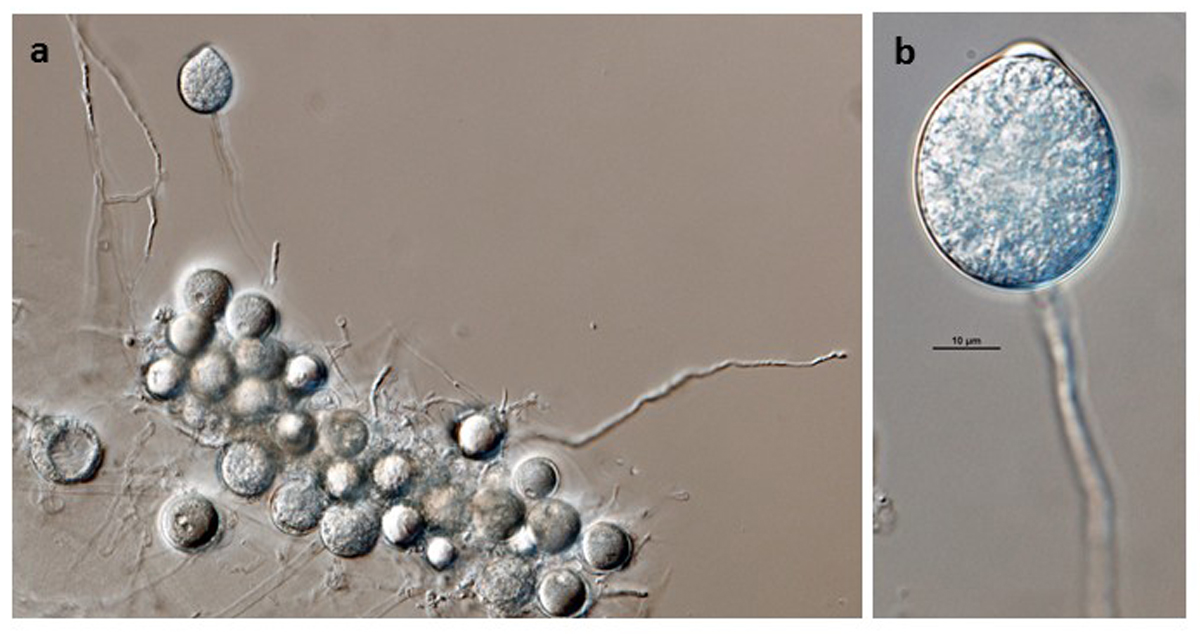 Phytophthora pini (ex-type CPHST BL 48) asexual phase formed on V8 agar flooded with soil extract: (a) sporangium originated in single long sporangiophore, oospores at bottom, (b) semipapillate persistent sporangium in single long sporangiophore; photos by G.Abad, USDA-APHIS-PPQ.
Phytophthora pini (ex-type CPHST BL 48) asexual phase formed on V8 agar flooded with soil extract: (a) sporangium originated in single long sporangiophore, oospores at bottom, (b) semipapillate persistent sporangium in single long sporangiophore; photos by G.Abad, USDA-APHIS-PPQ.
Phytophthora pini (ex-type CPHST BL 48) asexual phase formed on V8 agar flooded with soil extract: (a) sporangium originated in single long sporangiophore, oospores at bottom, (b) semipapillate persistent sporangium in single long sporangiophore; photos by G.Abad, USDA-APHIS-PPQ.
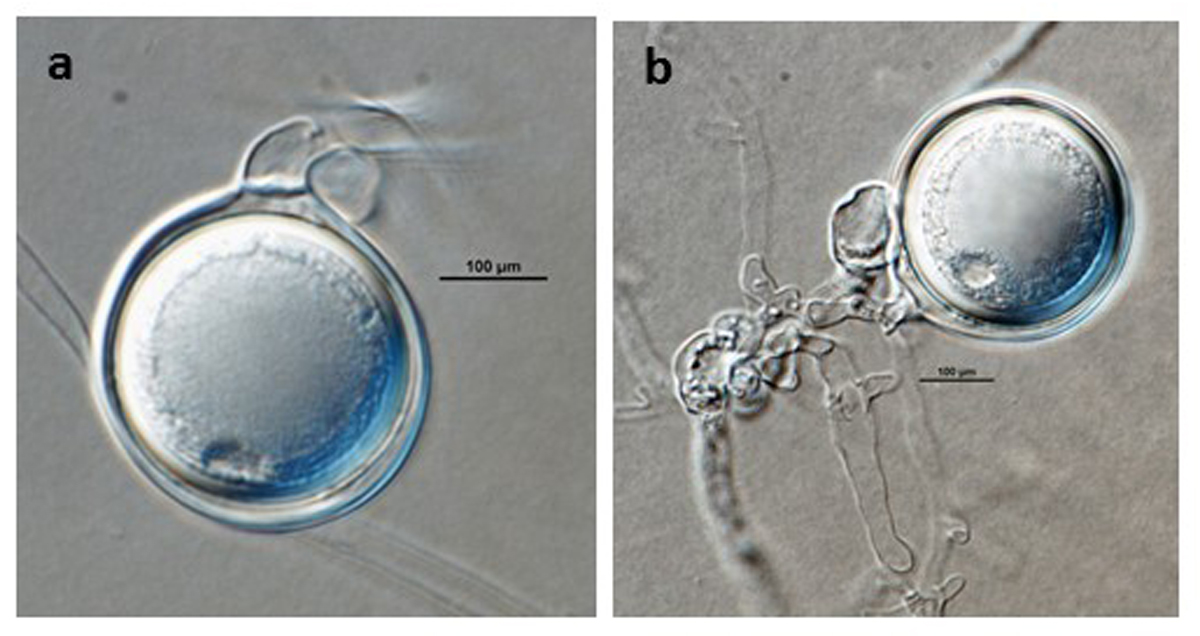 Phytophthora pini (ex-type CPHST BL 48) sexual phase formed on V8 agar flooded with soil extract: (a) smooth-walled oogonium with comma-like oogonial stalk, paragynous antheridium, and semi-aplerotic oospore, (b) plerotic oospore in smooth-wall oogonium with paragynous antheridium; photos by Gloria Abad, USDA-APHIS-PPQ.
Phytophthora pini (ex-type CPHST BL 48) sexual phase formed on V8 agar flooded with soil extract: (a) smooth-walled oogonium with comma-like oogonial stalk, paragynous antheridium, and semi-aplerotic oospore, (b) plerotic oospore in smooth-wall oogonium with paragynous antheridium; photos by Gloria Abad, USDA-APHIS-PPQ.
Phytophthora pini (ex-type CPHST BL 48) sexual phase formed on V8 agar flooded with soil extract: (a) smooth-walled oogonium with comma-like oogonial stalk, paragynous antheridium, and semi-aplerotic oospore, (b) plerotic oospore in smooth-wall oogonium with paragynous antheridium; photos by Gloria Abad, USDA-APHIS-PPQ.
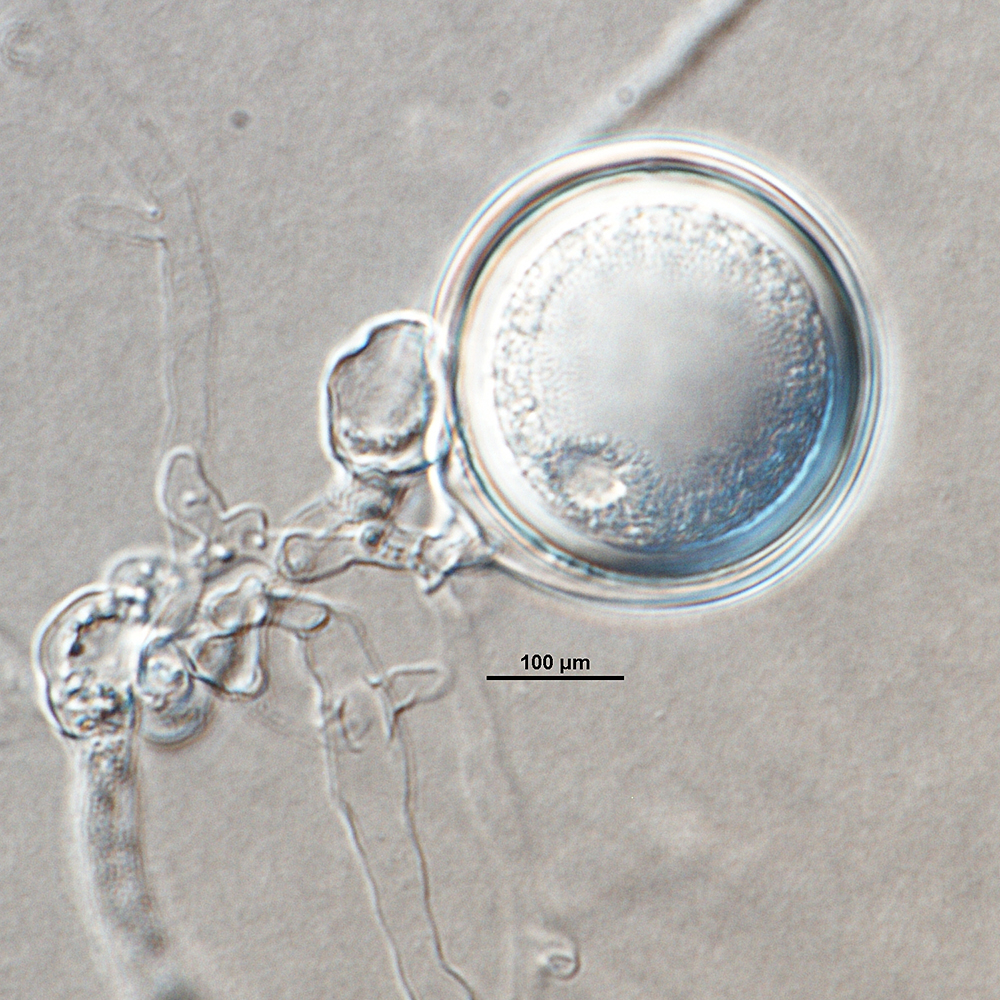 Phytophthora pini nbsp;(ex-type CPHST BL 48) sexual phase formed on V8 agar flooded with soil extract: plerotic oospore in smooth-wall oogonium with paragynous antheridium; photonbsp;by Gloria Abad, USDA-APHIS-PPQ.
Phytophthora pini nbsp;(ex-type CPHST BL 48) sexual phase formed on V8 agar flooded with soil extract: plerotic oospore in smooth-wall oogonium with paragynous antheridium; photonbsp;by Gloria Abad, USDA-APHIS-PPQ.
Phytophthora pini (ex-type CPHST BL 48) sexual phase formed on V8 agar flooded with soil extract: plerotic oospore in smooth-wall oogonium with paragynous antheridium; photo by Gloria Abad, USDA-APHIS-PPQ.
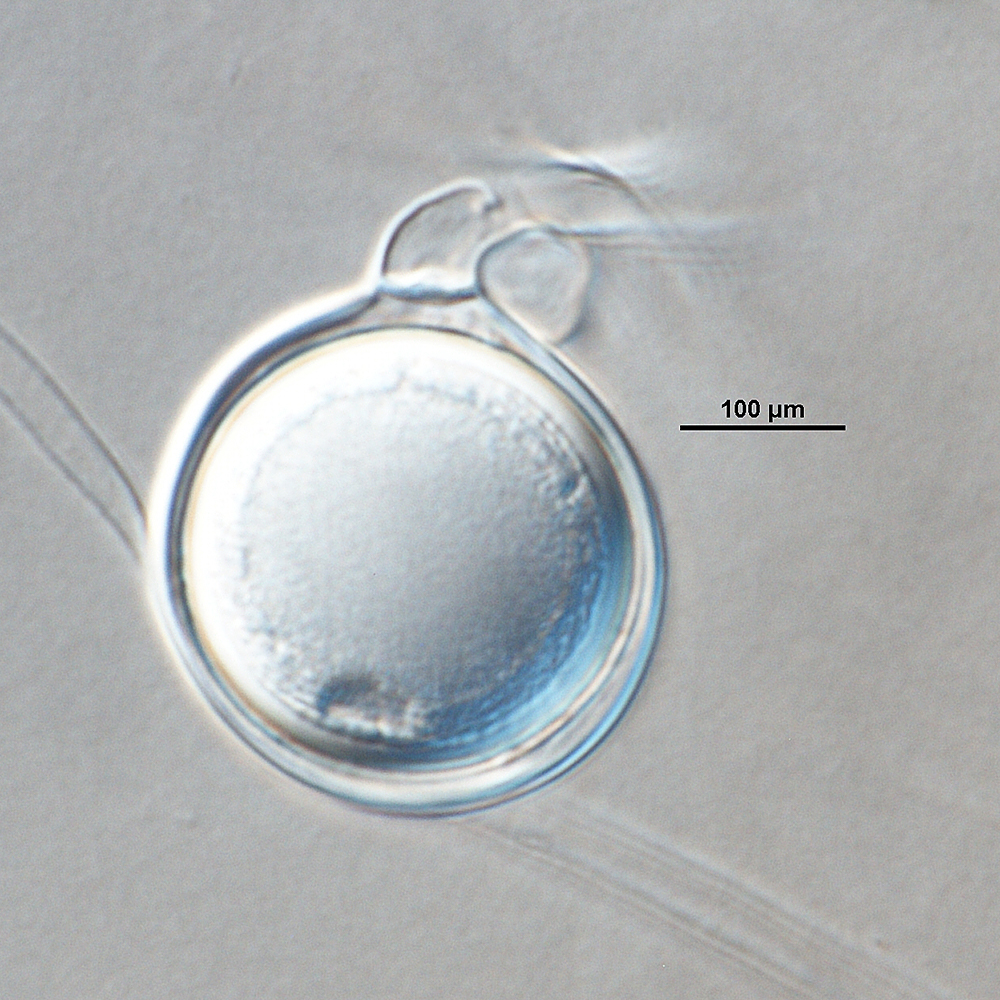 Phytophthora pini nbsp;(ex-type CPHST BL 48) sexual phase formed on V8 agar flooded with soil extract: smooth-walled oogonium with comma-like oogonial stalk, paragynous antheridium, and semi-aplerotic oospore;nbsp;photonbsp;by Gloria Abad, USDA-APHIS-PPQ.
Phytophthora pini nbsp;(ex-type CPHST BL 48) sexual phase formed on V8 agar flooded with soil extract: smooth-walled oogonium with comma-like oogonial stalk, paragynous antheridium, and semi-aplerotic oospore;nbsp;photonbsp;by Gloria Abad, USDA-APHIS-PPQ.
Phytophthora pini (ex-type CPHST BL 48) sexual phase formed on V8 agar flooded with soil extract: smooth-walled oogonium with comma-like oogonial stalk, paragynous antheridium, and semi-aplerotic oospore; photo by Gloria Abad, USDA-APHIS-PPQ.
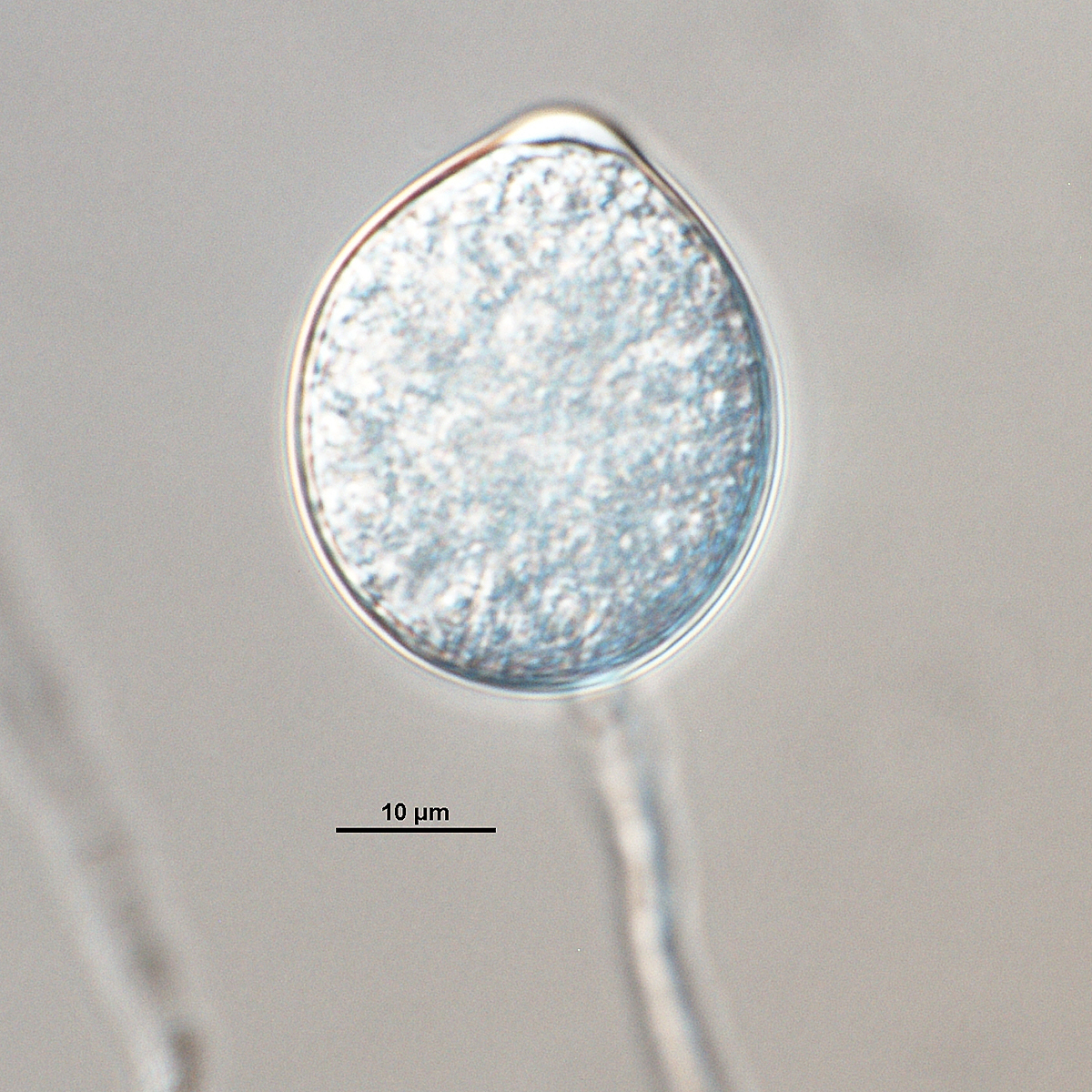 Phytophthora pininbsp; (ex-type CPHST BL 48) asexual phase formed on V8 agar flooded with soil extract: semipapillate persistent sporangium in single long sporangiophore; photonbsp;by G.Abad, USDA-APHIS-PPQ.
Phytophthora pininbsp; (ex-type CPHST BL 48) asexual phase formed on V8 agar flooded with soil extract: semipapillate persistent sporangium in single long sporangiophore; photonbsp;by G.Abad, USDA-APHIS-PPQ.
Phytophthora pini (ex-type CPHST BL 48) asexual phase formed on V8 agar flooded with soil extract: semipapillate persistent sporangium in single long sporangiophore; photo by G.Abad, USDA-APHIS-PPQ.

